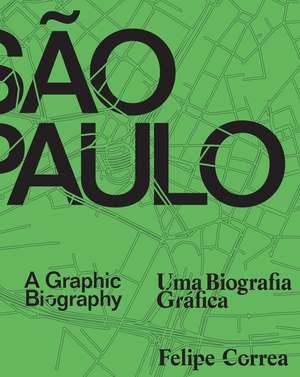São Paulo: A Graphic Biography
Editat de Felipe Correaen Limba Engleză Hardback – 29 oct 2018
Beyond presenting the first history of Paulista urban form and carefully detailing the formative processes that gave shape to this manufacturing capital, São Paulo shows how the city can transform its post-industrial lands into a series of inner city mixed-use affordable housing districts. By reorienting how we think about these spaces, the volume offers a compelling vision of a much-needed urban restructuring that can help alleviate the extreme socioeconomic divide between city center and periphery. This twenty-first century urban blueprint thus constitutes an impressive work of research and presents a unique perspective on how cities can imagine their future.
Preț: 468.67 lei
Preț vechi: 608.65 lei
-23% Nou
Puncte Express: 703
Preț estimativ în valută:
89.68€ • 93.88$ • 74.20£
89.68€ • 93.88$ • 74.20£
Carte indisponibilă temporar
Doresc să fiu notificat când acest titlu va fi disponibil:
Se trimite...
Preluare comenzi: 021 569.72.76
Specificații
ISBN-13: 9781477316276
ISBN-10: 1477316272
Pagini: 348
Ilustrații: 420 color and b&w illustrations
Dimensiuni: 235 x 295 x 36 mm
Greutate: 1.99 kg
Editura: University of Texas Press
Colecția University of Texas Press
ISBN-10: 1477316272
Pagini: 348
Ilustrații: 420 color and b&w illustrations
Dimensiuni: 235 x 295 x 36 mm
Greutate: 1.99 kg
Editura: University of Texas Press
Colecția University of Texas Press
Notă biografică
Felipe
Correa is an associate professor of urban design and Director of the Urban Design Program at the Harvard University Graduate School of Design. An architect and urbanist, he has developed numerous international projects through his practice, Somatic Collaborative. His previous books are Beyond the City: Resource Extraction Urbanism in South America, Mexico City: Between Geometry and Geography, and A Line in the Andes, which won first prize in the Architecture, Landscape, and Urbanism Category at the 2014 Pan American Architecture Biennale.
Cuprins
- Foreword / Prefácio
- Introdução / Introduction
- São Paulo: Models of Urban Growth / São Paulo: modelos de crescimento urbano
- Collective Living in South America: A Primer / Habitações coletivas na América do Sul: guia introdutório
- Infraestrutura de mobilidade: campanha do projeto urbano / Mobility Infrastructure: Driver of the Urban Project
- Urban Plans and Visions: A Genealogy of São Paulo / Planejamentos e visões urbanas: a genealogia de São Paulo
- An Evolutionary Plan: Connecting the City to the River / Plano evolutivo: conexão da cidade com o rio
Recenzii
[Presents] a complex analysis of the growth of Säo Paulo…offering tools for more sustainable development in the future.
Felipe Correa's impressive, heavily illustrated 'graphic biography' of São Paulo thoroughly conveys the layered complexity of the city's physical past and present, allowing someone like me, who hasn't set foot on Brazilian soil, to start to understand the place.
Sao Paulo: A Graphic Biography/Uma Biografia Gráfica is an exceptional addition to Correa’s growing list of publications and an exemplar of urban analysis and graphic communication. Although its focus is on a single city and aspects that can help it evolve meaningfully into the future, its lessons are applicable well beyond the boundaries of São Paulo to other contemporary cities that suffer from many of the same challenges—from outdated mono-functional infrastructure to derelict post-industrial lands ready for reenvisioning.
[São Paulo] should be celebrated as a valuable provocation for São Paulo's most critical development conundrum, which is how to position the city as conserving of hydrological systems for perpetuity, while redeveloping adjacent industrial tracts to improve connectivity and urban livability.
For those with a taste for clean design and visual aids, São Paulo: A Graphic Biography is both informative and aesthetically pleasing. Through words, photographs and illustrations, this graphic biography offers a unique analysis of the growth and sustainability of São Paulo alongside beautifully designed layouts and images.
[São Paulo's] focus on interscalarity allows for a remarkably comprehensive analysis of Sao Paulo’s geometric and organizational complexity and this alone makes it an important resource to both professionals and students of architecture, urban design or urban planning, who are interested in Sao Paulo. All the images and maps are of extremely high quality...what makes this book valuable is that it not only carefully situates some of Sao Paulo’s most complex physical problems, it also articulates ambitious, but undoubtedly doable, design proposals which, if they materialize, can significantly improve Sao Paulo’s residents’ quality of life.
There is much to commend in [São Paulo]. Along with its stylish design, the book is chock-full of thematic maps, architectural models, analytical diagrams, and historical and contemporary photographs—all of which parallel and enliven the text…São Paulo: A Graphic Biography serves as a useful reference work—and a beautifully illustrated one—with an emphasis on evolving urban forms and patterns of growth. From that angle, Correa provides important insights and possibilites for a notoriously complex metropolis...Overall, this is an impressive survey of the past, present, and future of the Paulista capital region.
Descriere
This extensively illustrated, bilingual English-Portuguese volume traces the physical development of Brazil’s largest city and presents a blueprint for transforming its aging industrial areas into mixed-use affordable housing districts.
